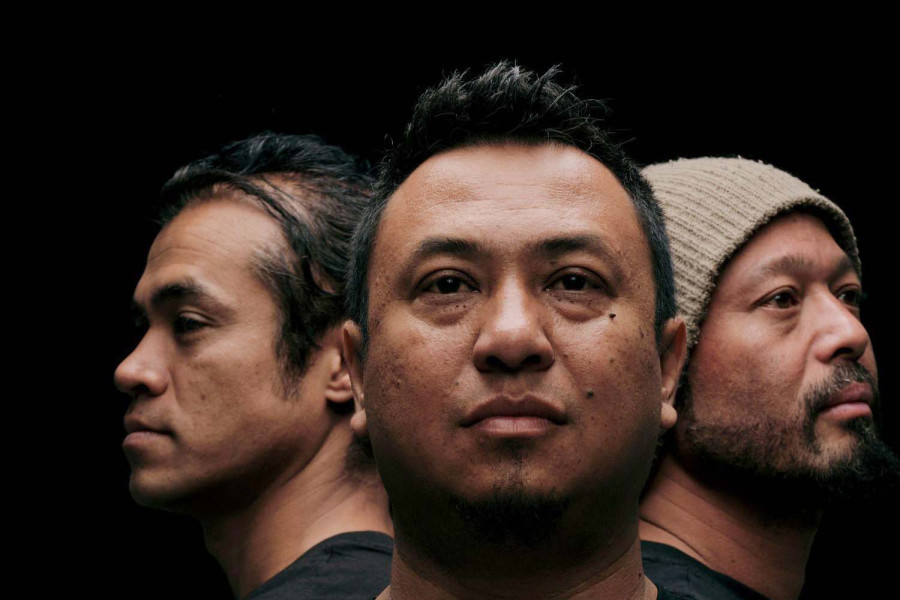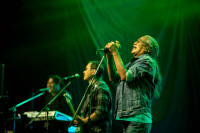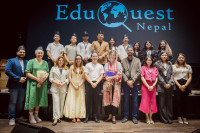Culture & Lifestyle
Mingling of traditional and modern
Members of Kanta Dab Dab, a band specialising in fusion of local Nepali and Western music elements, talk about their musical journey, local myths and how they promote community art.
Kshitiz Pratap Shah
“Kanta Dab Dab is actually a mysterious figure who used to roam around in the streets and ask for alms. Yet, he was not like other beggars, he used to enchant us with his Damaru. Although we don’t see him anymore, we still have fond memories of him and his music.”
As Nikhil Tuladhar and Sunit Kansakar reminisce about their local mystical figure and the role of local folklore music in their childhood, they are quick to remind how their work for their fusion band ‘Kanta Dab Dab’, was always for personal fulfilment rather than commercial. “We have always been more focused on the journey of creating music and growing in the process,” says Sunit, a sitar and guitar player who has been in the music industry for over two decades.
The band found its footing a while back, much before its actual formation in 2014. Nikhil and Sunit, the latter a professional drummer, joined bass player Riju Tuladhar in playing music among themselves from the late 90s. They recall playing together for multiple collaborations in Thamel and knowing each other since childhood. “It was for a festival around 2014, where we worked together on five songs for over two months when we formally became a band,” recalls Sunit. Those three then went on to name their band ‘Kanta Dab Dab’ as a homage to their local deity and the damaru he was believed to play.
‘Kanta Dab Dab’ has a unique, assimilatory identity in their music; a fusion of local folk music and more contemporary Western elements from rock and jazz, among others. The blend of harmonies from sitar, bass and percussion evokes a feeling nostalgic yet fresh and is heavily inspired by their belief in Nepali musical heritage as an integral footprint for novel, original creations. “All of us have worked with Western music for a fair bit beforehand, and we grew up playing our local instruments, so it was just the next step,” says Nikhil Tuladhar.
One shared passion among all band members has been their love for travelling. “We enjoy going to new places and sharing our music, having concerts abroad and representing Nepal gives us immense pride,” believes Sunit. In fact, ‘Kanta Dab Dab’ has prioritised concerts over the last nine years and is going on one such concert again from June 18 onwards—this time to various European countries, including Finland, Ireland, Norway, Poland and Germany.
Yet, they also believe such trips have not come without their hurdles, especially the bureaucratic ones. “Bands from other countries have their trips funded by their governmental bodies, but we don’t have any such funds here,” says Sunit. For a set of people so enthusiastic and striving to share their authentic, inherently local musical elements with a wider world, this lack of support is very discouraging indeed.
The Covid period has particularly hit their plans further, as the upcoming trip will be their first outside Nepal in five years. “It is not that they don’t have the money needed, but they rarely invest it in more than a limited number of bands,” adds Tuladhar.
Yet, despite these hurdles along the way, the band members of ‘Kanta Dab Dab’ still enjoy performing for the masses the most and connect to them in a personal way. “Even in very small public spaces, we have had housefull crowds of people telling us mid-performance how much our music touched them personally. This connection with our audience has always been our driving force,” says Tuladhar.
‘Kanta Dab Dab’ has incorporated exemplary elements from abroad, even beyond the music they produce. Echoes in the Valley (EitV) is an initiative that exemplifies this perfectly. Started in 2017, EitV is a non-profit organisation designed with the intention to set up community-based art production, with a special focus on promoting local cultural works. It involves creating small stages for each home in specific communities, each designed for a specific local form of art. The only limitation is that the artwork should be inherently local.
This idea was based on a similar project prominent in Dresden, Germany. “When we went there, we discovered that their initiative had started during World War II, when people were leaving their villages. This was one of the ways to bring people back home,” says Sunit. ‘Kanta Dab Dab’ members hope the same happens in Nepal, especially regarding a revival of folk music.
In regards to their other engagements, the members of ‘Kanta Dab Dab’ prefer keeping it spread out. The band members are engaged with multiple other bands and jobs. Nikhil and Sunit, for example, also perform together in Mukti and Revival, while Riju teaches Ethnomusicology at Kathmandu University. They have many other such side gigs as well, to back up their musical performances. “‘Kanta Dab Dab’ is not a source of bread and butter, as it targets a very niche market. We teach and have other, more mainstream gigs for that,” says Nikhil Tuladhar.
Part of that is also reflective in their schedule and way of performing, which they describe as easygoing. “We don’t have a specific schedule for the band. We meet in the studio whenever we have the time and practice. We play the music we like and whenever we are in the mood to”, says Sunit. The band also reveals that they prefer performing live to producing albums. Their new album, ‘Mānusaka’, releasing June 14, will be their second ever album release, after their eponymous debut album ‘Kanta Dab Dab’ in 2014.
Throughout their journey, one key thing the members of ‘Kanta Dab Dab’ have believed in is originality and promoting local music. “We cannot play Reggae music while representing Nepal in the world. Local music is global now,” says Nikhil. And this is exactly what the band wanted to suggest to new creators as well.
“The basics are there, but it's always important to strive for your own original sound. We here at ‘Kanta Dab Dab’ definitely have tried our best to do that,” he remarked, reminding me of the anecdote of the local mystical figure and the resonance these musical veterans found in his damaru to seek and continue his legacy.
And Kanta Dab Dab, the band, has followed in the footsteps of this local deity with charm, warm connectivity to the folk, and due diligence.
Kanta Dab Dab’s music recommendations
First Steps
Artist: Immortal Onion
Album: Ocelot of Salvation
Year: 2017
Ruins
Artist: Portico Quartet
Album: Ruins
Year: 2012
Medley live@Waschaus Potsdam
Artist: Pulsar Trio
Album: Zoo of Songs
Year: 2018
Ganapati
Artist: Trilok Gurtu
Album: Kathak
Year: 1998
Afternoon Ragas
Artist: Nikhil Banerjee
Album: Afternoon Ragas
Year: 1992
Pride and Joy
Artist: Stevie Ray Vaughan
Album: Texas Flood
Year: 1983




 10.12°C Kathmandu
10.12°C Kathmandu















